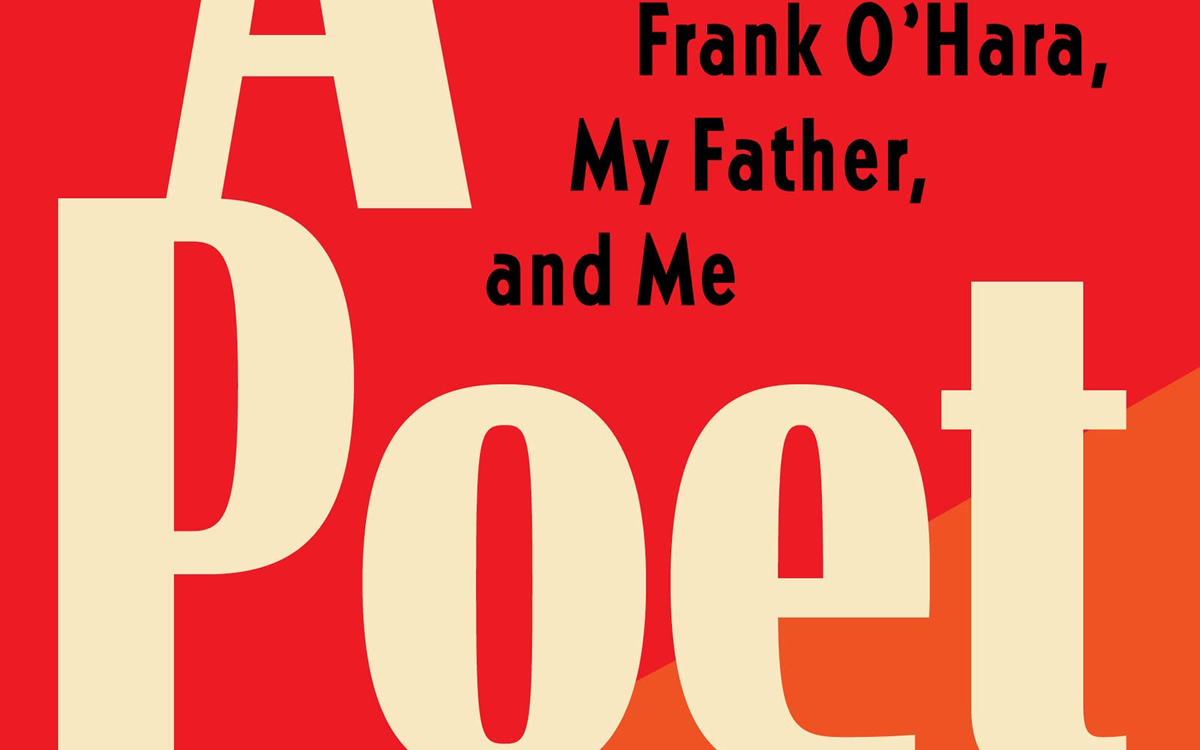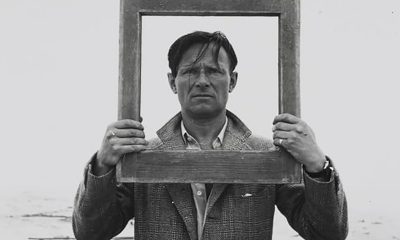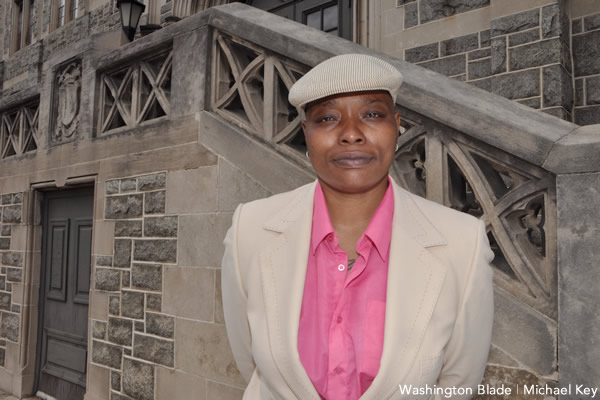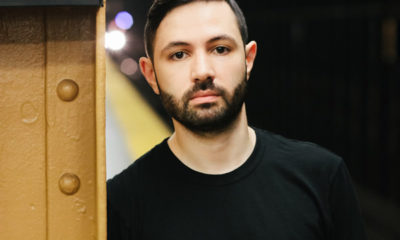Books
Calhoun and O’Hara give us hope that art will still be a life force
New memoir ‘Also a Poet’ will inspire readers

‘Also a Poet: Frank O’Hara, My Father, and Me’
By Ada Calhoun
c.2022, Grove Press
$27/259 pages
Families. Especially if your parents are acclaimed writers and artists, they can get under your skin. They love you, but sometimes withhold praise and suck the air out of the room. You wonder if you’ll end up as a second-string imitation of your famous folks.
That was what growing up was like for writer Ada Calhoun, author of the new memoir “Also a Poet: Frank O’Hara, My Father and Me.”
“Happy families are all alike; every unhappy family is unhappy in its own way,” Tolstoy wrote in “Anna Karenina.”
If you’re queer, you know not only how right Tolstoy was, but that family tension makes for riveting reading.
Calhoun, a lifelong New Yorker who grew up in the East Village, doesn’t disappoint.
Her parents are creative and talented. Her mother Brooke Alderson started out performing stand-up comedy in lesbian bars. Later, she was an actress whose most well-known roles were in “Urban Cowboy” and “Family Ties.”
Her father Peter Schjeldahl, born in 1942, is a poet and The New Yorker art critic.
Schjeldahl is far from a pompous gasbag. As The New York Times book critic Molly Young said recently, in his book “Hot, Cold, Heavy, 100 Art Writings 1988-2018,” Schjeldahl received, perhaps, the most awesome blurb ever. “Bruce is no longer the Boss; Schjeldahl is!” Steve Martin said of the volume.
Not surprisingly, Calhoun didn’t have a typical childhood.
Gay writer Christopher Isherwood, author of “The Berlin Stories,” was among those who Calhoun’s parents hung out with. “One of the most agreeable children imaginable,” Isherwood said of Calhoun when she was a child, “neither sulky nor sly nor pushy nor ugly, with a charming trustful smile for all of us.”
Most of us as kids see “The Nutcracker” with an aunt or grandma. Calhoun saw the holiday classic with a “dreamboat” poet. An artist posing topless so other painters could paint her wasn’t shocking to the young Calhoun.
While Calhoun’s Mom makes several memorable appearances, “Also a Poet” is focused on Calhoun’s relationship with her father.
Relationships between daughters and fathers can be difficult. But they’re often more fraught when the dad is a renowned writer. Especially when Calhoun, born in 1976, was growing up.
Then (thankfully, to a lesser extent, now) if you were a male writer, life in your household centered around you. You didn’t help with housework or pay much attention to your spouse and kids.
Though Calhoun was raised in the sophisticated East Village, life with her father fit this pattern. One day, Schjeldahl let her go alone, with no directions, at age eight on a bus to a friend’s birthday party.
When she was young, Calhoun wanted to escape the Village literary life. “My typical answer was farmer because that was the most tangible, least cosmopolitan option I could think of,” Calhoun writes, when as a kid, people asked her what she wanted to be when she grew up.
But Calhoun couldn’t evade the clutches of the writing bug. From early on, she wanted to get away from her father’s shadow. So her work could be judged on its own merit. She changed her last name from Schjeldahl to her middle name Calhoun.
Despite their difficulties, one thing bonded Calhoun with her dad: their love of Frank O’Hara, the openly queer poet and Museum of Modern Art curator, who died at 40 in a Jeep accident on Fire Island in 1966.
In the 1970s, Schjeldahl, who like so many poets, writers and artists then and now, idolized O’Hara, tried to write a biography of the beloved poet. But O’Hara’s sister and executor Maureen Granville-Smith derailed his attempt to write the bio.
But all wasn’t lost. Decades later, Calhoun discovered the tapes of the people (from Larry Rivers to Willem de Kooning) who Schjeldalhl had interviewed for the project in the basement of her parents’ building.
In a magnificent Rubik’s Cube of literary history and memory, Calhoun weaves a tale of family and of making art.
The memoir will inspire you to read O’Hara. O’Hara wrote funny and moving poems out of the pop culture and sadness of his time (from the “The Day Lady Died” on the death of Billie Holiday to the hilarious “Poem” – with the line “Lana Turner has collapsed!” to “Personal Poem” about Miles Davis being beaten by cops).
“His life force was on the page,” Grace Cavalieri, Maryland’s poet laureate and the producer/host of the radio show “The Poet and the Poem, said of O’Hara in an email to the Blade.
In this “Don’t Say Gay” era, Calhoun and O’Hara give us hope that art will still be a life force.
The Blade may receive commissions from qualifying purchases made via this post.
Books
Embracing the chaos can be part of the fun
‘Make Sure You Die Screaming’ offers many twists and turns

‘Make Sure You Die Screaming’
By Zee Carlstrom
c.2025, Random House
$28/304 pages
Sometimes, you just want to shut the door and forget what’s on the other side.
You could just wipe it from your memory, like it didn’t occur. Or create an alternate universe where bad things never happen to you and where, as in the new novel “Make Sure You Die Screaming” by Zee Carlstrom, you can pretend not to care.

Their mother called them “Holden,” but they’d stopped using that name and they hadn’t decided what to use now. What do you call an alcoholic, queer, pessimistic former ad executive who’s also “The World’s First Honest White Man,” although they no longer identify as a man? It’s a conundrum that they’ll have to figure out soon because a cop’s been following them almost since they left Chicago with Yivi, their psychic new best friend.
Until yesterday, they’d been sleeping on a futon in some lady’s basement, drinking whatever Yivi mixed, and trying not to think about Jenny. They killed Jenny, they’re sure of it. And that’s one reason why it’s prudent to freak out about the cop.
The other reason is that the car they’re driving was stolen from their ex-boyfriend who probably doesn’t know it’s gone yet.
This road trip wasn’t exactly well-planned. Their mother called, saying they were needed in Arkansas to find their father, who’d gone missing so, against their better judgment, they packed as much alcohol as Yivi could find and headed south. Their dad had always been unique, a cruel man, abusive, intractable; he suffered from PTSD, and probably another half-dozen acronyms, the doctors were never sure. They didn’t want to find him, but their mother called…
It was probably for the best; Yivi claimed that a drug dealer was chasing her, and leaving Chicago seemed like a good thing.
They wanted a drink more than anything. Except maybe not more than they wanted to escape thoughts of their old life, of Jenny and her death. And the more miles that passed, the closer they came to the end of the road.
If you think there’s a real possibility that “Make Sure You Die Screaming” might run off the rails a time or three, you’re right. It’s really out there, but not always in a bad way. Reading it, in fact, is like squatting down in a wet, stinky alley just after the trash collector has come: it’s filthy, dank, and profanity-filled. Then again, it’s also absurd and dark and philosophical, highly enjoyable but also satisfying and a little disturbing; Palahniuk-like but less metaphoric.
That’s a stew that works and author Zee Carlstrom stirs it well, with characters who are sardonic and witty while fighting the feeling that they’re unredeemable losers – which they’re not, and that becomes obvious.
You’ll see that all the way to one of the weirdest endings ever.
Readers who can withstand this book’s utter confusion by remembering that chaos is half the point will enjoy taking the road trip inside “Make Sure You Die Screaming.”
Just buckle up tight. Then shut the door, and read.
The Blade may receive commissions from qualifying purchases made via this post.
Books
Two new books on dining out LGBTQ-style
Visit nightclubs, hamburger joints, and a bathhouse that feeds customers

‘What is Queer Food? How We Served a Revolution’
By John Birdsall
c.2025, W.W. Norton
$29.99/304 pages
‘Dining Out: First Dates, Defiant Nights, and Last Call Disco Fries at America’s Gay Restaurants’
By Erik Piepenburg
c.2025, Grand Central
$30/352 pages
You thought a long time about who sits where.
Compatibility is key for a good dinner party, so place cards were the first consideration; you have at least one left-hander on your guest list, and you figured his comfort into your seating chart. You want the conversation to flow, which is music to your ears. And you did a good job but, as you’ll see with these two great books on dining LGBTQ-style, it’s sometimes not who sits where, but whose recipes were used.
When you first pick up “What is Queer Food?” by John Birdsall, you might miss the subtitle: “How We Served a Revolution.” It’s that second part that’s important.

Starting with a basic gay and lesbian history of America, Birdsall shows how influential and (in)famous 20th century queer folk set aside the cruelty and discrimination they received, in order to live their lives. They couldn’t speak about those things, he says, but they “sat down together” and they ate.
That suggested “a queer common purpose,” says Birdsall. “This is how who we are, dahling, This is how we feed our own. This is how we stay alive.”
Readers who love to cook, bake or entertain, collect cookbooks, or use a fork will want this book. Its stories are nicely served, they’re addicting, and they may send you in search of cookbooks you didn’t know existed.
Sometimes, though, you don’t want to be stuck in the kitchen, you want someone else to bring the grub. “Dining Out” by Erik Piepenburg is an often-nostalgic, lively look at LGBTQ-friendly places to grab a meal – both now and in the past.

In his introduction, Piepenburg admits that he’s a journalist, “not a historian or an academic,” which colors this book, but not negatively. Indeed, his journeys to “gay restaurants” – even his generous and wide-ranging definitions of the term – happily influence how he presents his narrative about eateries and other establishments that have fed protesters, nourished budding romances, and offered audacious inclusion.
Here, there are modern tales of drag lunches and lesbian-friendly automats that offered “cheap food” nearly a century ago. You’ll visit nightclubs, hamburger joints, and a bathhouse that feeds customers on holidays. Stepping back, you’ll read about AIDS activism at gay-friendly establishments, and mostly gay neighborhood watering holes. Go underground at a basement bar; keep tripping and meet proprietors, managers, customers and performers. Then take a peek into the future, as Piepenburg sees it.
The locales profiled in “Dining Out” may surprise you because of where they can be found; some of the hot-spots practically beg for a road trip.
After reading this book, you’ll feel welcome at any of them.
If these books don’t shed enough light on queer food, then head to your favorite bookstore or library and ask for help finding more. The booksellers and librarians there will put cookbooks and history books directly in your hands, and they’ll help you find more on the history and culture of the food you eat. Grab them and you’ll agree, they’re pretty tasty reads.
The Blade may receive commissions from qualifying purchases made via this post.

You’re going to be on your feet a lot this month.
Marching in parades, dancing in the streets, standing up for people in your community. But you’re also likely to have some time to rest and reflect – and with these great new books, to read.
First, dip into a biography with “Marsha: The Joy and Defiance of Marsha P. Johnson” by Tourmaline (Tiny Rep Books, $30), a nice look at an icon who, rumor has it, threw the brick that started a revolution. It’s a lively tale about Marsha P. Johnson, her life, her activism before Stonewall and afterward. Reading this interesting and highly researched history is a great way to spend some time during Pride month.
For the reader who can’t live without music, try “The Dad Rock That Made Me a Woman” by Niko Stratis (University of Texas Press, $27.95), the story of being trans, searching for your place in the world, and finding it in a certain comfortable genre of music. Also look for “The Lonely Veteran’s Guide to Companionship” by Bronson Lemer (University of Wisconsin Press, $19.95), a collection of essays that make up a memoir of this and that, of being queer, basic training, teaching overseas, influential books, and life.
If you still have room for one more memoir, try “Walk Like a Girl” by Prabal Gurung (Viking, $32.00). It’s the story of one queer boy’s childhood in India and Nepal, and the intolerance he experienced as a child, which caused him to dream of New York and the life he imagined there. As you can imagine, dreams and reality collided but nonetheless, Gurung stayed, persevered, and eventually became an award-winning fashion designer, highly sought by fashion icons and lovers of haute couture. This is an inspiring tale that you shouldn’t miss.
No Pride celebration is complete without a history book or two.
In “Trans History: From Ancient Times to the Present Day” by Alex L. Combs & Andrew Eakett ($24.99, Candlewick Press), you’ll see that being trans is something that’s as old as humanity. One nice part about this book: it’s in graphic novel form, so it’s lighter to read but still informative. Lastly, try “So Many Stars: An Oral History of Trans, Nonbinary, Genderqueer, and Two-Spirit People of Color” by Caro De Robertis (Algonquin Books of Chapel Hill. $32.00) a collection of thoughts, observations, and truths from over a dozen people who share their stories. As an “oral history,” you’ll be glad to know that each page is full of mini-segments you can dip into anywhere, read from cover to cover, double-back and read again. It’s that kind of book.
And if these six books aren’t enough, if they don’t quite fit what you crave now, be sure to ask your favorite bookseller or librarian for help. There are literally tens of thousands of books that are perfect for Pride month and beyond. They’ll be able to determine what you’re looking for, and they’ll put it directly in your hands. So stand up. March. And then sit and read.



















